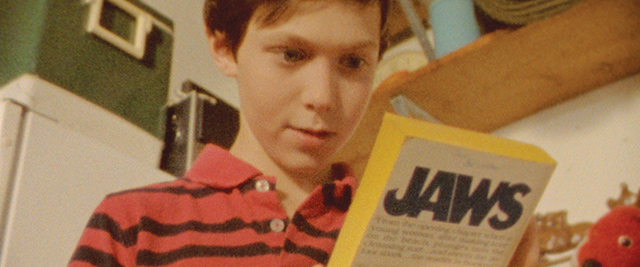Photo: Elias Levy/Creative Commons 2.0 License
Jaws and the Seduction of Fear
by Steve Desroches
Swimming in the ocean became an entirely different affair after 1975. For some, even going in a lake or a swimming pool at night became traumatic. As soon as you’re out over your head your toes curl, you head darts from side to side to survey the surface of the water for a large dorsal fin, and the heavy bass sound of “duunnn duunn” begins to quicken in your mind. And if a clump of seaweed grazes your leg you’re out of the water in a flash.
A compelling argument can be made that the Steven Spielberg blockbuster Jaws is the most influential movie of all time considering its still-potent ability to make those who have seen the film worldwide whirl in fear that a great white shark will eat them if they venture into the sea. When the film, based on the 1974 Peter Benchley novel of the same name, hit theaters that summer of 1975, the “Jaws Effect” was immediate. It changed the film industry and overnight created the concept of the summer blockbuster when it became the first to movie to make $100 million in just its U.S. theatrical run. But it also implanted the idea of sharks, in particular great white sharks, as killer monsters.

Consider that during that summer of ’75, and the several that followed, tourism to beach resorts in the United States saw a sharp decline, with the exception of the film’s shooting location, Martha’s Vineyard, which saw a big increase. And over the past 42 years the film has been the topic of academic study, film criticism, and social commentary. It seems that Jaws will have a lasting impact on culture worldwide for some time to come. At this week’s Provincetown International Film Festival, A Doll’s Eyes, a short film directed by Jonathan Wysocki, tackles one man’s obsession with Jaws.
“Practically everyone I talk to has a Jaws story,” says Wysocki. “They remember the first time they saw it and the fear that it put in them whether they live in landlocked Kansas or by the ocean.” A southern California native, Wysocki first saw the film when he was 10 years old in 1986, and it kept him out of the ocean for the next seven years. While the film scared him, he also became completely obsessed by it, often recreating scenes in his family’s swimming pool. As he grew older, and ventured back into the water, the fear never completely left him, nor did his fascination with the movie. His thinking became more abstract and he recognized the metaphors within the story, eventually seeing how this story about fear and anxiety of a killer shark lurking in the depths can be applied to that within ourselves. A Doll’s Eyes (whose name is taken from Quint’s U.S.S. Indianapolis monologue in Jaws) explores Wysocki’s personal obsession with the film, and the fear it instilled in him, along with his experience of coming out as a gay man.
“Die-hard Jaws fans who were really disturbed by it when they first saw it eventually come to address their own fear other than that of a literal shark,” says Wysocki in an interview from Paria via What’sApp. He is currently touring Europe with the film. “What fears and anxieties are in your own personal life? That’s really the scariest place to go. It’s easier to put your fears on the shark,” he adds.
That terror of sharks became a global phenomenon after Jaws, not just because the film was a worldwide mega hit that spawned three sequels, but it also led to a franchise of fear as the shark as monster became a theme of hundreds of films. Prior to 1975 there were two shark films that reached any level of popularity: the 1936 Australian movie White Death and the 1971 documentary Blue Water White Death, featuring Ron and Valerie Taylor, Australian shark experts who would go on to shoot live footage used in Jaws. But since Jaws, there have been films like Open Water (2009), Bollywood’s Aatank (1996), the Mexican film Tintorera (1977), Jaws in Japan (2009), Deep Blue Sea (1999), last summer’s The Shallows and this summer’s new take on the shark as monster, 47 Meters Down. There is even a 2012 porn parody of Jaws titled This Ain’t Jaws…filmed in 3D. And don’t forget the Sharknado franchise (2013 – present), Dinoshark (2010), Avalanche Sharks (2011), and Sharkenstein (2016), about an “undead” shark. It seems that these films, including the original Jaws, are most popular in the summer as part of an annual self-flagellation ritual when many in America are about to hit the beach.
All of those films are of course works of fiction, and there is no scientific research that shows that any species of shark can go “rogue” or develop a taste for humans. And those of us on Cape Cod have become more acutely aware of the great white shark since they began to frequent our waters again less than 10 years ago. Dr. Gregory Skomal senior fisheries biologist with the Massachusetts Marine Fisheries and head of the Massachusetts Shark Research Program who also works with the Chatham-based Atlantic White Shark Conservancy, says that the great whites are most abundant between the elbow of the Cape up to Provincetown and over on the bay side to the mouth of Wellfleet Harbor.
Historical records show that great whites have been in our waters since the 1800s, but the boom in their population is due to two things: success in conservation programs and the increase in seals, which, prior to legal protections put in place in the 1970s, were close to extinction. With these magnificent animals in such close proximity, marine scientists have an opportunity to study them like never before.
As for how the film has impacted the great white and other sharks directly, Skomal dispels a common myth. Jaws did not lead to a massive slaughter of sharks. While certainly some did hunt sharks, acting out a macho Quint fantasy, the decline in global shark populations was largely due to market demands. Some species of fish were in such decline that a demand for shark meat, or for other large fish, with sharks as a “by-kill,” increased, as did the taste for shark fin soup, previously only for the rich in China and Vietnam, but available to more with the rise of the middle class in each country. China recently put stringent restrictions on the hunting of sharks and the availability of shark fin soup. And Skomal says both the United States federal government and state government of Massachusetts have made sound public policy decisions with the conservation of sharks.
As for public safety, common sense should be the guide. Don’t swim near seals. Don’t swim at night. Stay closer to shore as sharks don’t tend to go in water six feet deep or less. Skomal says swimmers on Cape Cod are infinitely more at risk from riptides than sharks. Since 1670 there have only been five recorded shark attacks in Massachusetts waters, with two being fatal. As for Jaws, Skomal loves the movie. “For me personally, I saw it in a movie theater in 1975 and it inspired me to become a marine scientist,” says Skomal. “Jaws was very influential for me.”
A Doll’s Eyes screens as part of Shorts Two: New England Shorts Thursday, June 15 at 2 p.m. and Saturday, June 17 at 4:30 p.m. at the Art House, 214 Commercial St. Tickets are $15 and are available at the Provincetown International Film Festival box office at Whaler’s Wharf, 237 Commercial St. and online at provincetownfilm.org. For more information call 508.246.2402.




